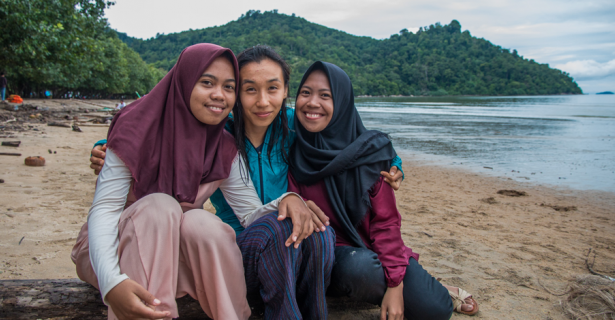The last time I was in Sukadana, Indonesia was three years ago in 2014. It was the fourth consecutive summer my sister, mother and I had spent in a rural village in West Kalimantan (Borneo) volunteering at ASRI (Alam Sehat Lestari), a conservation and health organization. The Indonesian name of the organization means “healthy nature everlasting,” and the acronym, ASRI, means, “harmoniously balanced.”
This year, I arrived on the day of the celebration of ASRI’s 10th Anniversary. The ASRI model is based in the understanding that human and environmental health are co-dependent. ASRI primarily works out of its clinic in Sukadana, where patients can exchange organic produce, rice, or labor in the organic garden for health care, as well as receive discounts if they come from a village that does not log the rainforest. But ASRI’s work extends far beyond the walls of the clinic. The organization runs a variety of programs including Goats for Widows, the Chainsaw Buyback Entrepreneurship Program, Forest Guardians, Sustainable Agriculture, Reforestation, Mobile Clinic, DOTS, ASRI Kids, and ASRI Teens.
To celebrate ASRI’s 10th anniversary, members and organizations in the community were invited to the beautiful new building, which will serve as a hospital and education center, to learn about ASRI’s programs. The most popular booths at the event were those of the ASRI Teens, a group of teenage students who graduated from the ASRI Kids program and started their own conservation club. I saw them teach local police how to make recycled paper, judge a drawing contest for kids, and explain the concept behind their group to curious guests.
My sister and I came up with the idea for ASRI Kids after our first trip to Sukadana in 2011. In 2012, after a year of fundraising and organizing, we traveled back for the inaugural session of the program, and now, six years later, the program has expanded beyond recognition. Although the faces were the same, the program was entirely their own. Watching the ASRI Teens on the day of the anniversary, I saw the same faces I knew well from my past four summers living in Sukadana, yet the program they were participating in was entirely their own.
When we left in 2014, ASRI Kids had expanded from its original capacity as an afterschool program in Sukadana to a mobile class integrated into fourth and fifth grade classrooms across the region.
In 2016, a group of ASRI Kids who had graduated from the program, continued to accompany Etty, the program’s main coordinator and teacher, to help her with her classes. They then decided to start their own club. Yuli, one of the oldest students, designed t-shirts which the group sells and uses the profits to help pay for field trips they take to local ecological sites. I spent time with ASRI Teens in the organic garden where they helped the staff plant corn.
Since the beginning of ASRI Kids, I have worried about the sustainability of the program, its ability to expand while maintaining its teaching goals, and its capacity to continue to provide students with first hand exposure to the environment through field trips. These concerns continue to be part of the dialogue while planning for the future, but seeing the growth of ASRI Teens and speaking to the staff and the students themselves about their goals for the program, has made it clear that ASRI’s youth programs have integrated themselves into the heart of the larger organization. The mission of integrating everyday life into a collective effort to protect the environment exists at the core of everything ASRI does. I believe it is what has made the organization’s model sustainable throughout its development, as well as the spirit that has inspired the growth of ASRI Kids into a passionate student led initiative.

